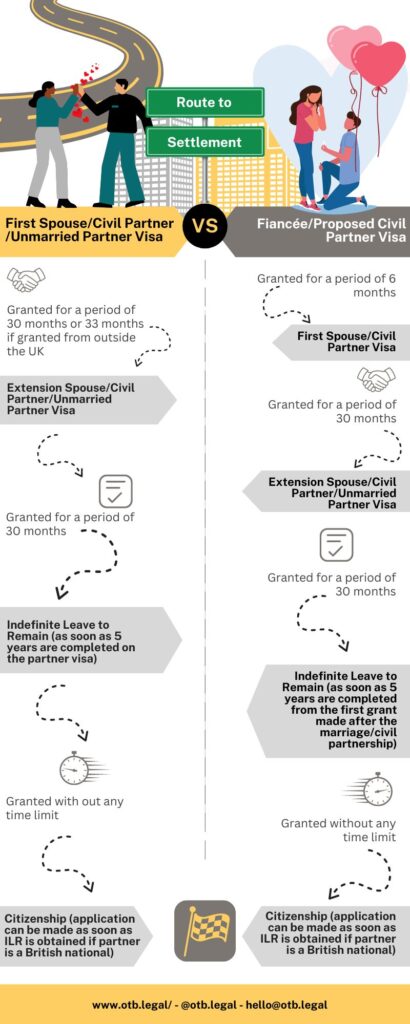Partner Visas and how they work:
A British person needs to sponsor their non-British partner if they wish to live together in the UK. The provisions for a partner visa are found under Appendix FM of the Immigration Rules and all lead to a route to settlement. The type of partner visas available under the Appendix FM rules are:
- Spouse Visa
- Civil Partnership Visa
- Unmarried Partner Visa
- Fiancée / Proposed Civil Partner Visa
Types of Partner Visas
Spouse and Civil Partnership Visa
The only difference in the Spouse and Civil Partnership visa is how the relationship is registered. If the couple have entered into a civil partnership, then the appropriate application would be under the civil partnership route, and likewise, the spouse visa route would be appropriate where the couple have entered into a legal marriage.
Unmarried Partner Visa
For couples who have neither married nor entered into a civil partnership, they may be able to make an application under the unmarried partner route. Under this route, there is an added onus on the applicant to demonstrate that they and their partner have been in a relationship similar to marriage or civil partner for at least two years.
Fiancée / Proposed Civil Partner Visas
Another route available to those who have not married or entered into a civil partnership is the fiancée/proposed civil partner visa. This route allows the non-British partner to enter the UK and then register their marriage or civil partnership inside the UK.
Route to Settlement

Spouse / Civil Partner / Unmarried Visa Pros and Cons:
Pros:
- Granted for a period of 33 months
- Gets the applicant on the 5-year route to settlement straightaway
Cons:
- Must have already married or entered into a partnership or be able to evidence that both have been in a relationship for 2 years
Fiancée / Proposed Civil Visa Pros and Cons:
Pros:
- Allows partners to marry or become civil partners inside the UK (this is particularly important for those who are unable to marry outside the UK)
- Allows the Applicant to submit their spouse or the civil partner visa from inside the UK after marriage/registration
Cons:
- Only granted for a period of 6 months
- Applicants rights are very limited during the initial 6 months (cannot work, use the NHS or study)
- More expensive and more applications involved
Discuss routes for you and your partner
We understand that trying to choose which visa works best for you and your partner can be confusing and dauting as it can have real life consequences if not thought through properly. We therefore offer a free no obligation consultation to discuss your situation and offer practical solutions and advice. Please do book in with one of our experts to discuss all the possibilities and routes available to you and your partner.

